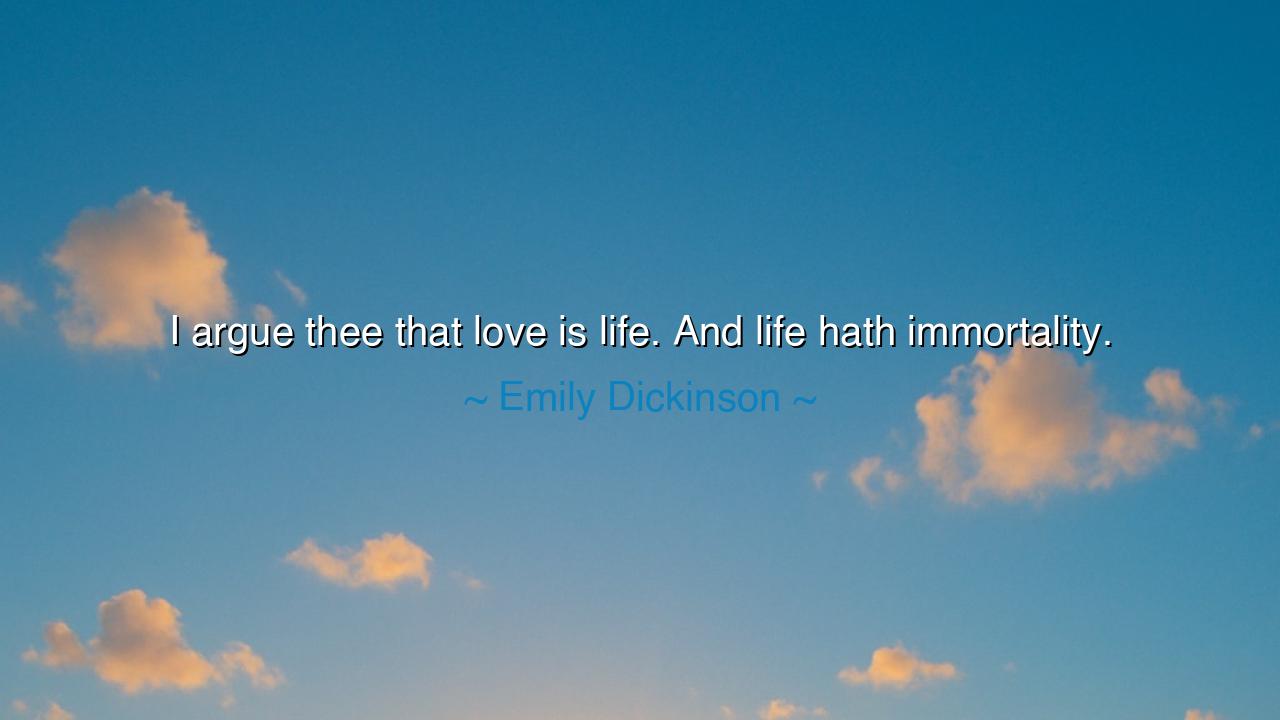
I argue thee that love is life. And life hath immortality.






"I argue thee that love is life. And life hath immortality." These profound words from Emily Dickinson reflect a timeless truth—love is the essence of life, and in that love, there exists a form of immortality. Dickinson's assertion is not a mere poetic ideal but a deep philosophical truth: love transcends the limitations of time and death, weaving a thread of continuity through the fabric of our existence. To love is to partake in something eternal, something that extends beyond the boundaries of the physical world, giving us a sense of immortality. Love connects us to the infinite, linking the fleeting nature of life with the timelessness of the soul.
In the ancient world, the concept of love was revered as a force that bridged the divine and human realms. Plato, in his dialogue The Symposium, spoke of love not merely as an emotional experience but as a spiritual ascent, a journey that begins with physical attraction but ultimately leads to the contemplation of truth and divinity. For Plato, love was not bound by time or the fleeting nature of the body; it was a divine force that connected the human soul with the eternal Forms. In this sense, love was immortal because it led us to the timeless truths that existed beyond the world of appearance and decay. Dickinson, in her own way, echoes this philosophical insight: love is the very substance of life, and in loving, we touch something beyond the physical—a thread that connects us to the immortal.
The example of Socrates provides another powerful illustration of love’s immortality. Socrates, though not often thought of as a lover in the romantic sense, devoted his life to the pursuit of truth and the love of wisdom. His commitment to love as the guiding force of his existence led him to teach, to question, and to inspire countless others. Even in death, Socrates’ love for truth and virtue lived on. His philosophy, transmitted through the words of his students like Plato, became a beacon of eternal wisdom. Though his physical body perished, his love for the pursuit of knowledge and justice continued to inspire generations, proving that love in its highest form is immortal—not only in its effects on others but in the legacy it leaves behind.
Consider also the life of Rosa Parks, whose quiet act of love and defiance changed the course of history. Parks, through her steadfast belief in justice and equality, demonstrated that love for humanity can transcend the limitations of time and place. Her courage ignited a movement that continued long after her own lifetime, proving that the love for freedom and dignity has a kind of immortality. The legacy of Parks’ love for justice, like all true acts of love, is not limited to her own life—it extends through the hearts and actions of those who continue to carry her message forward.
In a more personal sense, many of us can reflect on how love connects us to our own ancestors and history. Through the love of family, tradition, and shared experiences, we find that our lives are not isolated moments in time, but part of a larger, continuous story. The love we share today with those who have passed on is a testament to the immortality of connection and shared meaning. Love binds us across generations, creating a bridge between the past, present, and future—a love that does not end with death but continues to live in the hearts of those who carry its memory.
Dickinson’s words encourage us to embrace love as the most powerful force in our lives. To love is to live fully, to connect with something greater than ourselves. Love transcends the limits of time and space, and in loving, we partake in something eternal. We should not allow the mundane concerns of daily life to diminish the power of love. Instead, we must cherish it, for in doing so, we embrace the immortal essence of life itself. Love is the thread that connects us to all that is good and true, and by cultivating it in our lives, we live with a sense of purpose and immortality.
The lesson here is both simple and profound: the love we give and receive in our lives shapes not only the course of our own existence but also the eternal legacy we leave behind. Love has the power to transcend the physical realm, giving us a glimpse of the timeless, the divine. To live with love is to live fully—to recognize that the deepest essence of life is not in wealth, status, or achievements, but in the connections we forge through compassion, care, and understanding. Let us embrace love as the highest calling of our lives, knowing that in loving, we are engaging with something that endures, something that lives forever in the hearts of those we touch.






AAdministratorAdministrator
Welcome, honored guests. Please leave a comment, we will respond soon